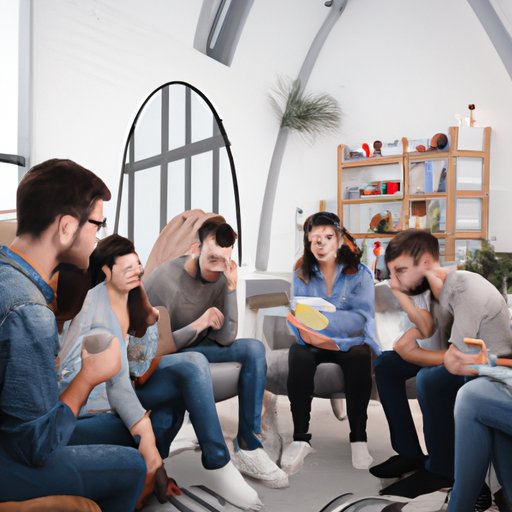Introduction
A “bad trip” is an intense and overwhelming experience, usually caused by the use of psychedelic drugs such as LSD, psilocybin, or MDMA. These experiences can be frightening and disorienting, leading to feelings of confusion, anxiety, and panic. Despite the discomfort of a bad trip, it is possible to recover and find ways to cope with the aftermath.
This article will explore eight tips for recovering from a bad trip. By talking to someone you trust, finding a support group, taking time for yourself, practicing mindfulness and relaxation techniques, getting plenty of rest, eating healthy meals and staying hydrated, and seeking professional help, you can take steps towards healing and feeling better.

Talking to Someone You Trust
One of the most important things you can do after a bad trip is talk about your experience. Talking about what happened can help you process your emotions, make sense of the experience, and gain insight into what happened. According to research, speaking openly about the experience can reduce post-traumatic stress symptoms and provide a sense of relief.
It is important to find someone you trust to talk to. This could be a family member, friend, or therapist. It is also helpful to find someone who has had similar experiences, such as another person who has also had a bad trip. Having someone who understands what you are going through can be comforting and validating.
Finding a Support Group
Another way to cope with the aftermath of a bad trip is to join a support group. A support group can provide a safe and non-judgmental space to discuss your experience. Research suggests that attending a support group can reduce symptoms of post-traumatic stress and lead to a greater sense of well-being.
There are many online and in-person support groups for people who have had a bad trip. To find one, you can ask your doctor or therapist for recommendations, search online for local support groups, or reach out to friends who may know of a group.
Taking Time for Yourself
After a bad trip, it is important to take some time for yourself. This can involve activities such as reading, listening to music, writing in a journal, meditating, or engaging in a creative activity. Doing something enjoyable can help distract you from negative thoughts and give you an outlet for expressing your emotions. Taking some time for yourself can also help you reconnect with yourself and regain a sense of calm.
Making time for yourself can be difficult, especially if you are busy with work or school. It is important to prioritize self-care, even if it means taking a few minutes out of your day to do something that brings you peace and joy.
Practicing Mindfulness and Relaxation Techniques
Mindfulness and relaxation techniques can be helpful in managing the aftermath of a bad trip. These practices can help you become more aware of your thoughts and feelings, allowing you to observe them without judgment. They can also help you manage stress and anxiety and cultivate a sense of peace and calm.
Examples of mindfulness and relaxation techniques include meditation, deep breathing, yoga, progressive muscle relaxation, guided imagery, and tai chi. Experimenting with different techniques can help you find the ones that work best for you.
Getting Plenty of Rest
Getting enough sleep is essential for recovery after a bad trip. Sleep helps the body and mind to heal and can reduce symptoms of stress and anxiety. Aim to get seven to nine hours of sleep each night and avoid sleeping during the day, as this can disrupt your natural sleep cycle.
If you are having trouble sleeping, there are several strategies you can try. For example, avoiding caffeine and alcohol late in the day, establishing a regular bedtime routine, and avoiding screens before bed can all help promote better quality sleep.

Eating Healthy Meals and Staying Hydrated
Eating healthy meals and staying hydrated can help you feel better after a bad trip. Eating nutritious foods can boost your energy levels and improve your mood, while drinking plenty of water can help flush out toxins and keep you hydrated.
Try to eat at least three meals a day, focusing on whole grains, fruits and vegetables, lean proteins, and healthy fats. Avoid processed foods and sugary drinks, which can leave you feeling sluggish and low. Aim to drink eight glasses of water per day and stay away from caffeinated beverages, which can interfere with your sleep.
Seeking Professional Help
If you are still struggling with the aftermath of a bad trip, it may be helpful to seek professional help. A therapist or counselor can provide individualized guidance and support as you work through your experience. They can also provide tools and techniques for managing stress and anxiety.
In some cases, medication may be recommended. Antidepressants, anti-anxiety medications, and antipsychotics are all potential treatment options. It is important to speak to a mental health professional before taking any medication.
Conclusion
Having a bad trip can be a traumatic experience. But with the right strategies and support, you can recover and move forward. Talking to someone you trust, finding a support group, taking time for yourself, practicing mindfulness and relaxation techniques, getting plenty of rest, eating healthy meals and staying hydrated, and seeking professional help can all help you heal and begin to feel better.
If you have experienced a bad trip, remember that you are not alone and that it is possible to recover. With patience and self-care, you can find ways to cope and make sense of your experience.
(Note: Is this article not meeting your expectations? Do you have knowledge or insights to share? Unlock new opportunities and expand your reach by joining our authors team. Click Registration to join us and share your expertise with our readers.)
